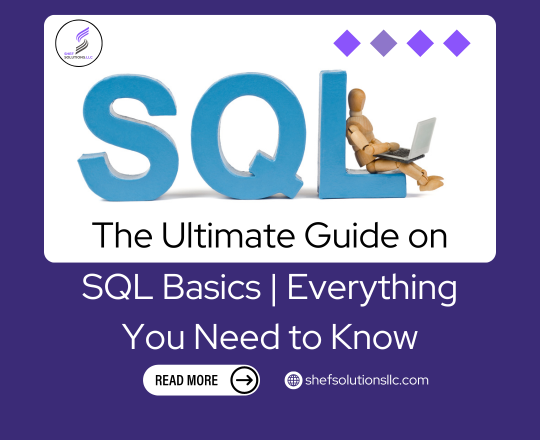Currently Empty: $0.00
Data Science
The Ultimate Guide on SQL Basics | Everything You Need to Know

SQL (Structured Query Language) stands tall as the universal language for interacting with databases. Whether you’re a seasoned developer, a data analyst, or just starting your journey in tech, understanding SQL basics is essential.
In this guide, we’ll explore everything you need to know to get started with SQL.
What is SQL?
SQL, pronounced as “sequel” or “S-Q-L,” is a domain-specific language used in programming and designed for managing and manipulating relational databases. Originally developed by IBM in the 1970s, SQL has evolved into an industry standard adopted by virtually all modern database systems, including MySQL, PostgreSQL, SQLite, SQL Server, and Oracle.
Why Learn SQL?
Learning SQL opens doors to a plethora of career opportunities in fields such as data science, software engineering, business intelligence, and database administration.
Here are a few reasons why mastering SQL is advantageous:
- Universal Applicability
- Data Retrieval and Manipulation
- Data Analysis and Reporting
- Career Advancement
- Universal Applicability: SQL is widely used across industries and is compatible with various database management systems.
- Data Retrieval and Manipulation: SQL enables efficient retrieval, insertion, updating, and deletion of data from databases.
- Data Analysis and Reporting: SQL skills are invaluable for conducting complex data analysis and generating insightful reports.
- Career Advancement: Proficiency in SQL is highly sought after by employers, making it a valuable skill for career advancement and job opportunities.
SQL Basics
1. SQL Commands:
SQL commands are categorized into four main types:
DDL (Data Definition Language) – Used to define and modify the structure of database objects such as tables, indexes, and constraints. Common DDL commands include `CREATE`, `ALTER`, `DROP`, and `TRUNCATE`.
DML (Data Manipulation Language) – Used to manipulate data stored in the database. Common DML commands include `SELECT`, `INSERT`, `UPDATE`, and `DELETE`.
DQL (Data Query Language) – Used to retrieve data from the database. The primary DQL command is `SELECT`.
DCL (Data Control Language) – Used to control access to data within the database. Common DCL commands include `GRANT` and `REVOKE`.
2. SQL Syntax:
SQL syntax follows a specific structure and conventions. Key components of SQL syntax include:
Keywords: Reserved words used to perform specific tasks in SQL statements (e.g., `SELECT`, `FROM`, `WHERE`).
Clauses: Components that make up SQL statements and specify the action to be performed (e.g., `SELECT` clause, `WHERE` clause).
Expressions: Combination of constants, column names, operators, and functions used to manipulate data.
Comments: Text that provides explanatory notes within SQL code (e.g., `– This is a comment`).
3. SQL Queries:
SQL queries are statements used to retrieve data from a database. The most commonly used SQL query is the `SELECT` statement, which retrieves data from one or more tables based on specified criteria.
Example:
SELECT column1, column2
FROM table_name
WHERE condition;
Also, read – Top reasons to learn python
4. Data Types:
SQL supports various data types for storing different types of data, including integers, decimals, strings, dates, and more. Common data types include `INT`, `VARCHAR`, `DATE`, `FLOAT`, and `BOOLEAN`.
Getting Started with SQL
To start learning SQL, you can follow these steps:
1. Set Up a Development Environment: Install a relational database management system (RDBMS) such as MySQL, PostgreSQL, or SQLite on your computer. Many RDBMSs offer free versions for educational purposes.
2. Learn SQL Syntax: Familiarize yourself with SQL syntax, keywords, clauses, and expressions. Practice writing basic SQL queries to retrieve and manipulate data.
3. Explore SQL Commands: Dive deeper into SQL commands, including DDL, DML, DQL, and DCL. Understand their purpose and usage in database management.
4. Practice Regularly: Practice writing SQL queries and commands regularly to reinforce your understanding and improve your skills. There are many online resources and platforms offering SQL tutorials, exercises, and challenges.
5. Build Projects: Apply your SQL skills to real-world projects such as creating databases, designing schemas, querying data, and generating reports. Building projects will not only solidify your knowledge but also showcase your expertise to potential employers.
Conclusion
SQL is a fundamental skill for anyone working with data or databases. By mastering SQL basics, you gain the ability to interact with and manage databases effectively, opening doors to exciting career opportunities in technology and beyond. Whether you’re a beginner or an experienced professional, investing time and effort in learning SQL will undoubtedly pay off in the long run.
If you aspire to acquire proficiency in SQL, we extend an invitation to join or enroll in our comprehensive Data Science or Artificial Intelligence courses, where alongside SQL, we provide comprehensive instruction on a multitude of complementary tools.

